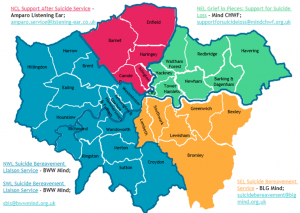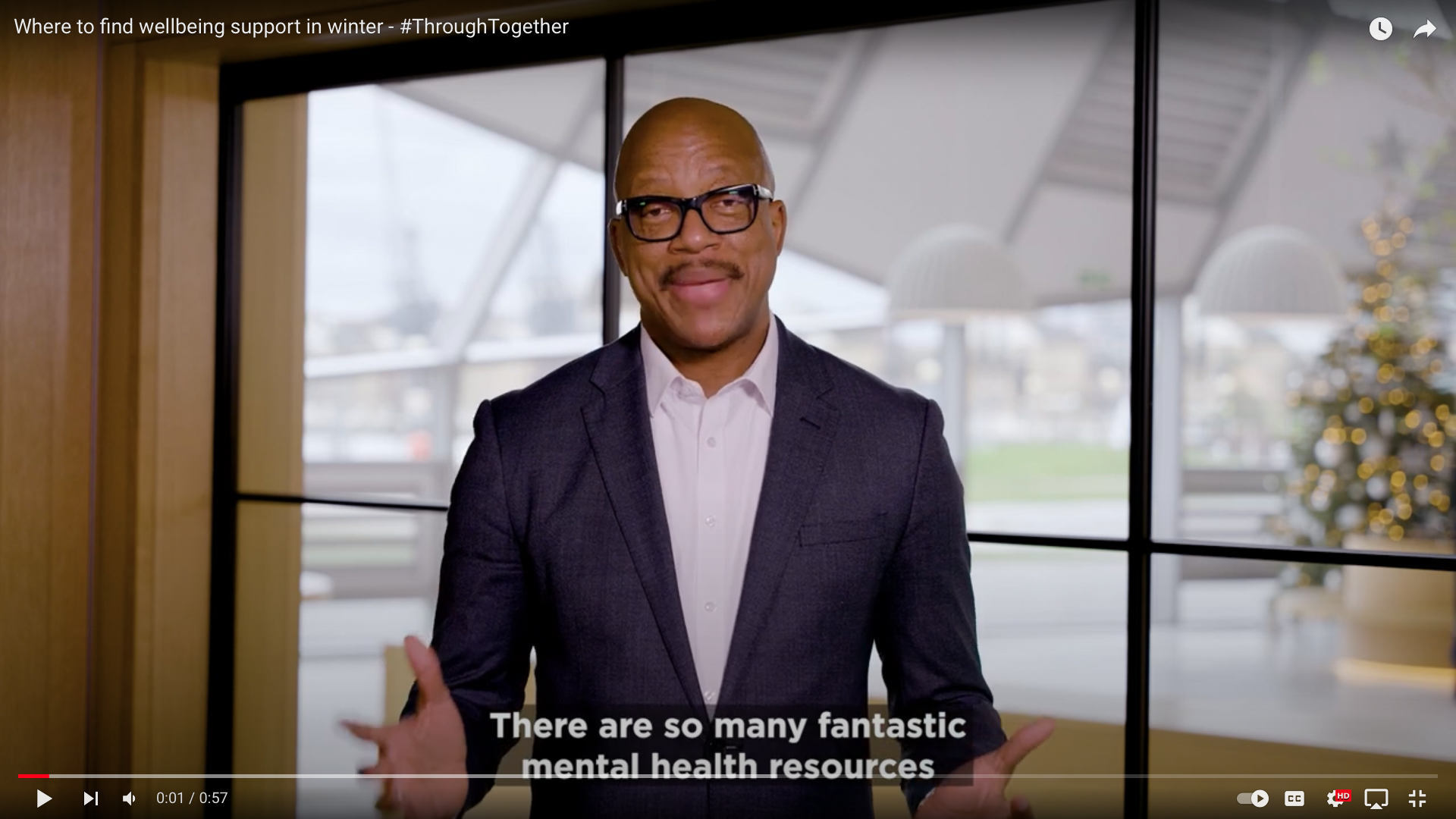
Suicide Prevention
Thrive LDN is the regional lead for suicide prevention in London on behalf of NHS England.
Thrive LDN is the regional lead for suicide prevention in London on behalf of NHS England.

Sub header main
Caption main
Description main goes here
Around 10 people a week take their own life in London. Although London’s suicide rate is the lowest in England, it varies significantly across the capital.
Thrive LDN is the regional lead for suicide prevention in London on behalf of NHS England.
Thrive LDN and partners share the ultimate aspiration of making London a zero suicide city. We are working together to learn from current good practices of working which will better enable connections and conversations across London partners that will assist suicide prevention and reduction.
We believe partnership working is paramount to creating meaningful change. Below you read about our current and past projects and find out more about how we are working with partners to inform methods of prevention.
Thrive LDN Suicide Prevention Group
As the regional lead for suicide prevention in London, Thrive LDN facilitates the multi-agency Suicide Prevention Group (SPG), overseeing the development of regional strategy for suicide prevention and delivering citywide projects to prevent suicide and support those affected by suicide. The group is made up of over 50 statutory, private and VCSE sector organisations including London ICBs, NHS Trusts, police forces, universities, and mental health charities, as well as people with lived experience of suicide.
The SPG has been a key enabler of regional, sub-regional and local suicide prevention and postvention activities, including championing the development of London’s Real-Time Surveillance Systems (RTSS).
#ZeroSuicideLDN
More than 10 people a week take their own life in London. If someone was in crisis, would you know what to say? Since 2019, Thrive LDN has led the #ZeroSuicideLDN campaign to encourage thousands of Londoners to take FREE online suicide prevention training.
We’ve partnered with the Zero Suicide Alliance, who have created a training program to help people to be able to identify warning signs and to feel comfortable having conversations about suicide. Click here to read more about the campaign and to take the training.
Thrive LDN Real Time Surveillance System for suspected suicides
Timely and high-quality data, evidence and intelligence allows for better understanding of the drivers of suicide, the development of more effective interventions, and more rapid responses to prevent suicides.
Launched in 2019, Thrive LDN’s Real Time Surveillance System (RTSS) for suspected suicides, co-hosted by the Metropolitan Police Service (MPS), provides a secure platform to collect and share real-time data on suspected suicides between multiple agencies and to generate the intelligence to inform suicide prevention activity across London. Real-time monitoring of suspected suicides enables more timely targeted short-term intervention and long-term prevention programmes that address identified patterns of suicide within London. Doing so helps to reduce the number of Londoners who take their own life whilst providing invaluable insight into circumstances around suicide and mental health issues in London.
Given the known higher risk of suicide of those bereaved by suicide, the RTSS also facilitates systematic identification of bereaved individuals and, with their informed consent, referral into ICB-commissioned bereavement services. London ICBs are provided with direct access to contact details of bereaved individuals in their locality, to then make a proactive support offer.
Thrive LDN Real Time Surveillance System for self harm
In 2024, Thrive LDN expanded the RTSS to include data on hospital presentations for intentional self-harm in partnership with NHS Digital. This advances the established partnership and data sharing arrangements between London partners. This is particularly significant as a recent episode of self-harm is one of the biggest risk factors for attempted and completed suicide; monitoring of the incidence, methods, and demographic trends relating to self-harm is essential in the development of short- and long-term suicide prevention strategies.
Training and Resources
We have collaborated with various partners to provide a series of training programmes and resources to support individuals and organisations.
- Zero Suicide Alliance’s free, online suicide prevention training. Click here to read more about the #ZeroSuicideLDN campaign and to take the training.
- First hand witness to suicide – a resource, developed in partnership with the Support after Suicide Partnership (SASP) and Grassroots in Brighton, for anyone affected by witnessing a suicide, when they did not know the person who has died.
- Trauma-informed practice training – delivered in partnership with Nicola Lester Psychological Trauma Consultancy.
- Mental Health Awareness Training – delivered in partnership with Healthy Dialogues to London’s key workers and community champions.
- Thrive LDNs Help Yourself and Others – we have created a space on our webpage that brings together ideas, inspiration and resources to enable good, including free wellbeing training opportunities.
Support and Signposting
Samaritans provide free emotional support, advice & information, 24 hours a day, 365 days a year. Call 116 123 or email jo@samaritans.org or visit some branches in-person
SANEline provide support to people struggling with their mental health or supporting someone who is. Call 0300 304 7000 (4.30pm–10pm every day).
National Suicide Prevention Helpline UK are a supportive listening service for anyone with suicidal thoughts. Call 0800 689 5652 (6pm- midnight every day)
Campaign Against Living Miserably (CALM) support people affected by suicide or suicidal thoughts. Call 0800 58 58 58 (5pm–midnight every day) or use their webchat service.
Papyrus HOPELINEUK supports people under 35 who are struggling with suicidal feelings. Call 0800 068 4141 (24 hours, 7 days a week), email pat@papyrus-uk.org or text 07786 209 697.
The Nightline Association’s Nightlines are student-run listening & information services for university students, available every night via phone, instant messaging, text, and in-person.
.
Shout is a free, confidential 24/7 text service for people in crisis. Text the word ‘SHOUT’ (or ‘YM’ if you’re under 19) to 85258.
NHS urgent mental health helplines are available 24 hours a day, every day.
Therapy, listening and counselling services
The Caravan Drop-In and Counselling Service provides free listening, emotional support, and counselling with volunteer therapists 7 days a week.
NHS talking therapies are evidence-based and confidential psychological treatments delivered by fully trained and accredited NHS practitioners. Free on the NHS for adults 18+ registered with a GP in England. Self-refer online or ask your GP to refer you.
James’ Place London provides free quick-access therapeutic support to men 18+ in a suicidal crisis. You can self-refer or be referred by a health professional. Call 020 3488 8404 open Monday to Friday 9.30am-5.30pm or email london@jamesplace.org.uk.
The Listening Place provides free, face-to-face support for adults 18+ who feel that life is no longer worth living. Sessions are by appointment only. Open 7-days-a-week 9am-9pm. You can self-refer here or be referred by a health professional or another charity. Call 020 3906 7676 or email administration@listeningplace.org.uk
Past Projects
Suicide Prevention Education
Thrive LDN recognises the importance of instilling suicide prevention at an early age to address poor mental health and to ensure that Londoners live in a suicide safer city. We have worked with Papyrus UK to provide tailored suicide prevention education to schools, colleges and universities across London.
In 2019, a series of suicide awareness and prevention training sessions aimed at equipping schools and young people to become suicide safer. Three training levels were offered to schools aimed at driving awareness to spot and address warning signs that a young person might be thinking of suicide, developing a school safety plan and how to provide direct support. As a result of this training, over 1,140 school staff across all London boroughs were trained. Further details of the project can be found in the page here
Following the success of the school’s pilot, we developed a suicide prevention training offer to address the growing mental health needs of students. Evidence shows that suicide remains the highest cause of death for those aged between 18-25 years. Moreover, 75% of anxiety, mood, impulse control and substance use disorders develop by the age of 24. This project aimed to upskill and equip staff and institutions with the knowledge and skills to better understand suicide, suicide prevention and develop appropriate safeguarding procedures for vulnerable students. This training supported 350 staff from over 80 higher and further education institutions across London. The training has enabled staff to respond to students thinking about suicide and to help keep them safe. Further information on the project can be found here.
The education program consists of three different workshops – a 90 minute session, half day session and the ASIST two-day course.




